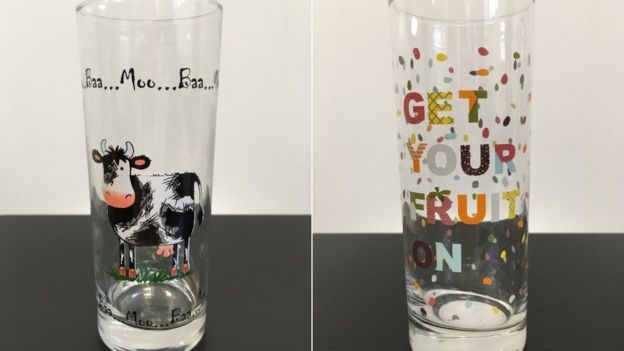Amazon withdraws painted children’s drinking tumblers
Amazon has withdrawn from sale a set of painted Disney character children's drinking glasses amid safety fears.
The paint used contains the toxic metal cadmium which is associated with a risk of damage to kidneys and bones and may lead to cancer, according to the NHS.
However, provided safety standards are met, the use of paint containing cadmium is permitted on glassware.
In the withdrawn Amazon glasses cadmium was found close to the rim where the risk of ingesting it was highest.
Dr Andrew Turner of the University of Plymouth analysed the decorated children's tumblers and said he would personally not wish to use them on a long term basis.
Amazon said in a statement that "all sellers must follow our selling guidelines and those who don't will be subject to action including potential removal of their account".
The Amazon glasses were produced under license from Disney by a company called Half Moon Bay which said it was "investigating this product and its manufacture in light of the reported findings of Plymouth University".

Dr Turner said: "I would refrain from giving these to young children and I think I would refrain from using them myself as well."
Other glasses sold by Tesco and Plymouth-based The Range were found to have paint containing lead and cadmium, but the paint was further away from the rim, where the risk was deemed to be lower.
Dr Turner, who has tested a wide range of painted glasses, said: "We get these two chemicals in most of the glassware that we test."
Tesco said all of its drinking glasses complied with EU and UK safety standards and those examined by Dr Turner had also been independently tested "to show compliance" with a voluntary standard on lead and cadmium.
Neither of these substances are banned from being used in paint on glassware.
'Taking unnecessary risks'
Rayware, which supplies the glasses tested from The Range, said the glasses passed EU and UK safety standards.
The Range said it had removed the product from sale as a precaution while further investigations were carried out.
Expert Dr Caroline Taylor from the University of Bristol said ingesting lead could lead to behavioural problems and lower IQs in children.
"I feel that there's no need for this kind of paint to be on glasses so why are we taking unnecessary risks," she said.
The FSA said in a statement that anyone who suspected "something deficient with their glassware" could report it to Trading Standards at their local authority or Citizen's Advice.
Trading Standards would then investigate and report any concerns to the FSA.